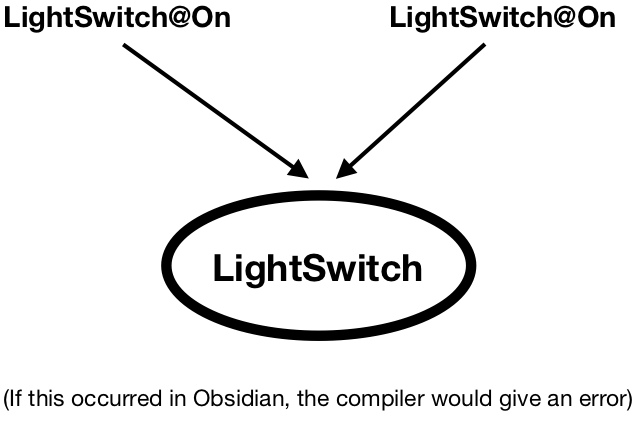States – Introduction¶
In our new programming language, contracts can define states. For example, a LightSwitch is always either Off or On (never both):
contract LightSwitch {
state On;
state Off;
}
In addition, fields can be specified to be available only within certain states. For example:
contract LightSwitch {
state On {
int brightness;
}
state Off;
int switchLocation available in On, Off;
}
In the example above, brightness can only be accessed and used when a LightSwitch is in the On state. On the other hand, switchLocation can be accessed and used in both On and Off, but couldn’t be accessed in any other states if they existed.
States and Ownership¶
Each object can have ONE reference that statically specifies what state the object is in. For example,
LightSwitch@On is the type of a variable that refers to a switch that is in On state.
Note that this is an extension of ownership: like ownership, one reference is special. The compiler keeps track of the possible states an object can be in and makes sure that the specifications are observed. For example:
transaction foo() {
LightSwitch s = new LightSwitch(); //Assume a LightSwitch is in Off upon instantiation
s.turnOn();
}
States are related to ownership because only ONE reference (the owning reference) can specify state. To see why this is, consider the figure below, which shows two references of type LightSwitch@On referencing the same LightSwitch object:
The figure shows a hypothetical situation that is invalid in Obsidian programs. Suppose the reference on the left is used to change the state of the LightSwitch from On to Off. The reference on the left would then have type LightSwitch@Off, but the reference on the right would still have type LightSwitch@On, which would be inconsistent with the state of the object. To prevent this situation, we require that only owning references carry state information. As a result, any reference that includes state information is automatically also an owning reference.
The compiler checks transaction invocations to make sure they are safe:
transaction foo() {
LightSwitch s = new LightSwitch(); //Assume a LightSwitch is in Off upon instantiation
s.turnOff(); // COMPILE ERROR: turnOff() requires that s is On, but here s is Off
}
NOTE: there is never a need to specify both ownership and state at the same time; if a field is in any state, it must be Owned, and if Unowned, the field cannot have a state.
